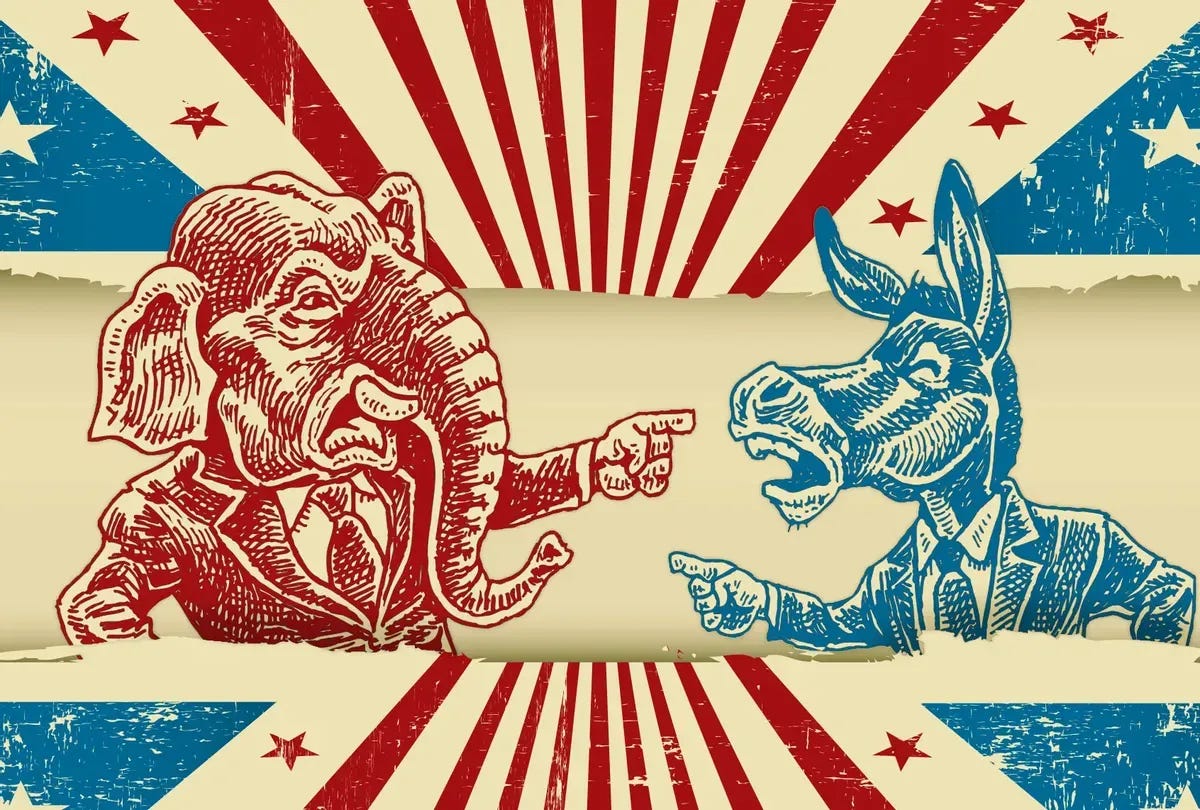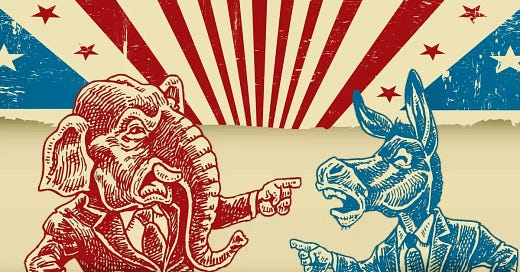Christians, Politics and...AntiChrist?
Are politically motivated Christians really up to no good?

There was a bit of a strange dustup on social media recently. One Patrick Schreiner, a professor at Midwestern Seminary, posted a quote by Michael F. Bird, himself apparently an Australian Anglican priest and biblical scholar, to the effect that religious people who try to wield political power are the antichrist.
Schreiner offered the above quote without comment or qualification - he just put it out there. It received some pushback, not too surprising, and almost 24 hours later Schreiner offered some ex post facto qualifiers regarding why, exactly, he left Bird's comment out there, without any supposed context, for an entire day.
These kinds of questionable machinations by celebrity Christians, even if their celebrity extends only to students at the schools where they teach, are of a piece with some of the celebrity evangelicals I wrote about recently here. Christianity Today editor Russell Moore, in particular, has had high-handed things to say about any Christian who merely voted for Trump, never mind whether that Christian was involved in actual (shudder) politics.

I have heard otherwise thoughtful Christians say that their fellow believers should be less concerned with making America great and more concerned with loving their neighbors. Close personal friends from my childhood have embraced this point of view regarding proper Christian practice. This sentiment was especially popular during the last presidential election among online Christians who were trying to discourage their friends from voting for Trump. Which causes me to suspect, I admit, that we might reasonably expect more of this kind of hectoring in the buildup to the next election.
(Spoiler alert: I am a fan of Trump only by comparison with who he has run against in the general election. I was a Scott Walker fan during the 2016 primaries, along with all the other voters apparently that one other voter. But those who chastise Trump for his morals are often laughably blind, willfully so it seems to me, to the character of his opponents. If you still think Trump represents some unique threat to the republic but were/are not equally concerned about Clinton and Biden, I've got nothing for you.)
It is, perhaps, worth noting that the admonition against the pursuit of political power is almost always directed at Christians on the political right. The fact that this prohibition is not equally directed toward left-leaning Christians is possibly a clue to the underlying motivations. I would like to be wrong about this, but a reasonable person has to at least smell a rat.
Whatever else is going on here, there is some sort of theme at work among Christians of a particular sensibility. It is a sensibility that considers the seeking or wielding of any kind of political power to be incompatible with Christian moral hygiene.
I find something about this line of thought to be both jarring and strangely shallow. Here's why: it is simply self-evident that political power can sometimes be wielded in ways consistent with Christian love. This is not always the case, of course, because the primary role of governments is temporal justice. As such, the government's obligations don't neatly overlap with the obligations of christians or of the church. In fact, the state and the church operate with differing spheres of authority. Only the government, as far as I can tell, is ordained by God to execute retributive justice. (This is predicated on governments rightly distinguishing between good and evil – something that many governments have blatantly inverted as a matter of official policy.)
In contexts in which the government is corrupt, it may be that political power wielded by faithful Christians is an unambiguous and direct manifestation of Christian love. Doing as much as possible to prevent the injustices and harm done by an unjust and wicked political class can be a kind of moral imperative for those with the opportunity and giftedness to pursue it. I'm thinking specifically of people like William Wilberforce and his work to abolish the slave trade. Was he the antichrist? The question practically answers itself.
I want to preface what follows by confessing that I am personally driven batty by the tedium of practical politics. At one point in my young adult life, I thought I might want be more directly involved in politics, so I attended a meeting of the local branch of one of the two major political parties in the U.S. There are no words sufficient to tell you just how much I hated the boring minutia involved in that meeting. Before it was over, my eyes were rolling back in my head. I wanted to run from the room like a scalded dog. I'm very grateful there are people who are both good at, and oriented toward, this kind of thing. But believe me when I tell you – I am not one of those people. So what follows should not be read as some kind of thinly veiled aspirations on my part - nothing could be further from the truth.
In the remainder of this post, I'd like to take up the question of whether making American great is as completely divorced from Christian concerns as these various church ladies scholars and writers presuppose. I have a few rhetorical questions I'd like to ask, in no particular order.
Is it more loving, or less, to promote a form of government that is predicated on the following: the created-ness of human beings; a transcendent basis for human rights; and the resulting prescription for governments that they must enforce these principles for the benefit, rather than the exploitation, of the citizens?
Is a government more likely to act justly if predicated on an understanding that its human agents will never be entirely virtuous, or is it likely to be more just if it is structured on the fanciful premise that human beings are perfectible, and the power invested in human agents should be maximized accordingly?
Whoever decides the premise and structure of governments, then, whether those governments are ultimately just or unjust, is exercising political power. Is a Christian, who advocates for governments that are predicated on what is true, really doing something unrelated to love for his neighbor? All governments are structured according to axiomatic assumptions about the nature of human existence. For Christians to abandon the field where these questions are being hotly debated hardly seems like an act of kindness and love. Whether their government is operating on true assumptions about such questions, after all, marks the dividing line between whether their neighbor is likely to temporally flourish or languish.
So I guess much depends on what it is about America that some Christians are trying to make great. Whatever it is, it has Moore, Schreiner, Bird and other likeminded political activists commenters in high dudgeon.
The justification offered by the American founders, at that nation's very inception, was predicated on the "self-evident" existence of a creator, rights that inure to human beings as an artifact of having been created, and the resulting moral constraints and obligations thus placed on governments. All of these ideas are right there in the Declaration of Independence. The founders went even so far as to bake a kind of world-weary recognition of human moral frailty into the U.S. Constitution itself. These things are, well, pretty great actually. At least they are great insofar as they reflect a reality-based understanding of the circumstances of our actual existence.
Truth-based rationales and constraints for governments (e.g. God is real and any form of government should be downstream from this assumption) are far more likely to yield justice and minimize harm than governments that emerge from faulty assumptions about the nature of the world we live in, and what it means to be human. This was essentially the very point being inferred by C.S. Lewis when he observed:
“Aristotle said that some people were only fit to be slaves. I do not contradict him. But I reject slavery because I see no men fit to be masters.”
Even time spent in the most half-hearted reflection would suggest, then, that making America great, or merely wielding a bit of political power toward that end, can easily be consistent with a concern for the well-being of others. Depending, of course, on what one means by "great".
But regarding the suggestion that Christians who are engaging energetically in an effort to influence the political direction of their nation are, somehow, the antiChrist, well, somebody needs to stop spending so much time in the faculty lounge. One definition of antiChrist offered in the the bible is anyone who denies that Jesus came in the flesh. If the left has their way, federal judges who believe in the incarnation are disqualified from being judges (e.g. See leftist politicians' most recent questioning, during confirmation hearings, for any judges who are "out" with their Christian faith.) Are Moore et al calling these leftist politicians antiChrists? <crickets chirping> <crickets chirping> ...
There are many politically active Christians in America, some of whom I myself have talked with, who are generally only interested in pushing for policies and behaviors that reflect a greater fidelity to the American founding principles, rooted as those principles are in accurate assumptions about the nature of the created order. These Christians perceive this as something that will benefit not only themselves, but their neighbors as well. What they are up to is really not any more sinister than that.
At any rate, Christians who pursue or have political power are mostly just annoying the cool kids manifestly not, ipso facto, neglecting their Christian obligations - notwithstanding the histrionic objections of random seminary professors and the editor of Christianity Today.




